'Given the way in which the PLA operates today, I don't believe local commanders were necessarily acting without approval of higher levels.'
'They were acting in a way which they believed they were carrying out the intent of the higher levels.'

M Taylor Fravel is the leading expert on China's border issues.
Based at the Massachusetts Institute of Technology, Dr Fravel provides the context for the deadly clash on the India-China border.
Dr Fravel, who has written often about China's border disputes, including Strong Borders, Secure Nation, argues that better delineation of the Line of Actual Control could reduce the chance of conflict, and that both China and India are better served by avoiding tension, especially at a time that China views the United State as its main adversary.
"I don't think China is looking for a wider conflict with India on the China-India border," Dr Fravel tells Senior Rediff.com Contributor P Rajendran.
What do you make of the situation?
For the last six weeks, there has been a clear increase in Chinese activity along the Line of Actual Control -- the intrusions apparently in several areas.
These are kind of unprecedented, right? Before, China generally would intrude in one area; here, maybe it intruded in three or four at the same time.
The Chinese posture was very different from 2013 in Depsang, 2014 in Chumar, even 2017 in Doklam.
That created conditions for the kind of clash that we saw on Monday night.
I don't think China necessarily intended for there to be a clash.
It looks like it was part of a struggle over the implementation of the June 6 commanders meeting.
That (set off) the deadliest clash since 1967.
There were some military commanders who took on more aggressive postures, but appeared quite conciliatory when the Doklam impasse was addressed in 2017.
Would that argue that local leaders of China's People's Liberation Army (an offshoot of the Communist Party of China) were acting on their own?
Given the way in which the PLA operates today, I don't believe local commanders in China were necessarily acting without approval of higher levels.
They were acting in a way which they believed they were carrying out the intent of the higher levels.
Tactics on the ground can vary.
At the same time I don't think that China is looking for a wider conflict with India on the China-India border.
China's main strategic concern and adversary is the United States, it's not India.
So (a local conflict) distracts China from its focus on the United States, or creates opportunities for the United States to gain influence on China's borders.
So the moderate tone of the individual you are referring to probably reflects that strategic consideration for China.
India is really a secondary concern; the United States is a primary concern.
A wider clash (with India) would distract China from focusing on that.

Isn't the PLA working closely along with the people in the senior Chinese political system?
They certainly are. Clearly, up until this point the PLA appears to have been taking the lead...
I don't think the PLA was acting without higher approval.
It was carrying out a clear and deliberate plan.
But certainly in terms of the interaction with China, it was primarily limited to talks among the military commanders.
Given the history, what do you think is likely to happen next?
It's unclear what will happen next.
If you look at the Chinese statement, China believes India violated the June 6 commanders meeting agreement.
India believes that China violated the agreement. (India states the Chinese did not withdraw as agreed upon; China states Indian soldiers crossed the Line of Actual Control).
But the focus of both sides on that agreement is that the likely way to resolve this in the short term would be to go back and focus on implementing that agreement if that is still possible.
I don't think India wants a wider conflict either.
I think both sides, at the national, political level, have an incentive to prevent further escalation.
The recent phone call between the Indian external affairs minister and the Chinese foreign minister, I took to be a positive sign that attention was being elevated within the respective political systems from the military level to the political and diplomatic levels.
What would be a possible solution to the situation?
This sounds idealistic. I don't know if both sides would be willing to do it.
But it seems clear to me that what India and China need is an agreed upon the Line of Actual Control -- or maybe just a Line of Control, where each side clearly acknowledges the limits of their presence -- not necessarily the limits of their sovereignty claims, but the limits of their physical presence and use that as a way to reduce the potential for all these kinds of clashes.
This is basically the fourth major incident in seven years, and there has been a number of minor incidents.
This is by far the most significant (going) by the reports.
They all have had to deal with the lLine of Actual Control.
India and China both tried to improve their positions there.
That increases the activity there.
That increased activity creates more opportunity for conflict to occur.
- What Dr Fravel told Rediff.com in 2009: 'China has settled all land border disputes except with India and Bhutan'
- What Dr Fravel told Rediff.com in 2017: 'India has deployed troops in a third country for the first time to challenge China'
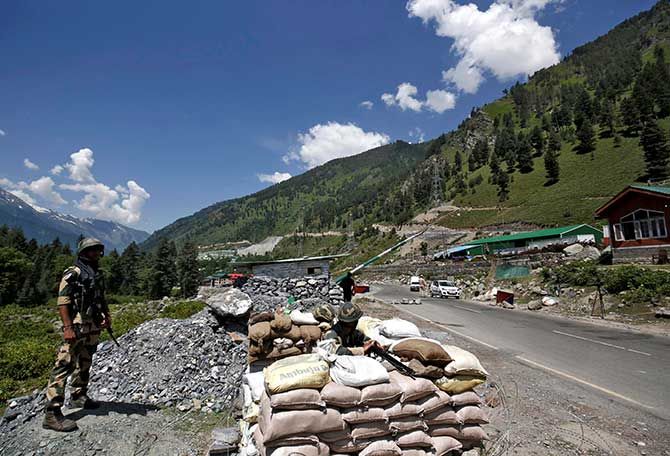
What about the sovereignty issue?
Would that not be the ultimate solution?
Sovereignty would be the ultimate solution, but both sides haven't been able to agree upon it, going back to at least 1960, when (then Chinese premier) Zhou Enlai visited New Delhi and proposed a settlement -- a package deal solution.
India is not going to make any concessions in the eastern sector in the state of Arunachal Pradesh, and China is not going to make any concessions in the western sector.
(They need to) agree to sort things in each sector at a broad level.
Then you would have to figure out where the actual border would lie.
And that may involve some additional negotiations.
From China's viewpoint, India's improved position on the LAC in the western sector (threatens its claims there).
Which goes back to main reasons why China fought India in 1962, which was to protect the road that connected (the regions of) Tibet and Xinjiang through Ladakh or Aksai Chin and, from China's perspective, maintain its territorial integrity.
There have been suggestions that involve India ceding part of Ladakh and China dropping claims on Arunachal Pradesh.
Would that be an equitable solution as you see it?
Swapping Arunachal Pradesh for Ladakh? In terms of square kilometres, that would give India 90,000 kilometres versus 33,000 kilometres to China.
India would keep an area three times as big.
China would be giving up an area three times as big as it keeps.
My fear is that if the two sides pursue a sector-by-sector approach, and negotiate each sector separately, China will adopt a far more stringent position in the eastern sector and actually demand concessions wherever that happens.
Strategically, isn't Ladakh more important to the Chinese than Arunachal Pradesh?
Yes, absolutely. Strategically, Ladakh is much more important to China.
There are a variety of reasons why we see greater crises on the western sector, but one of them is that China cares a lot about it.
It doesn't trust India, going back to 1962 regarding Indian pressure.
Production: Ashish Narsale/Rediff.com




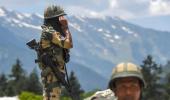
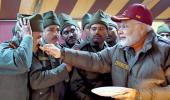




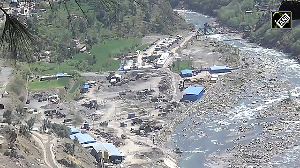
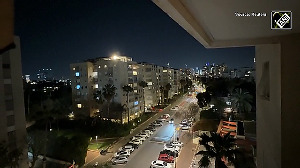
 © 2025
© 2025